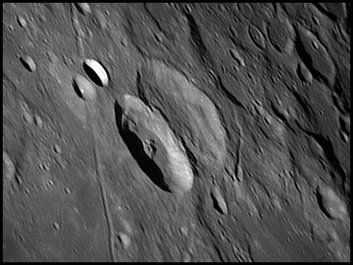IN THE NAME OF GOD, THE MOST GRACIOUS, THE DISPENSER OF GRACE:
THE LAST HOUR AND MOON SPLIT ASUNDER
(1) THE LAST HOUR draws near, and the moon is split asunder! [Most of the commentators see in this verse a reference to a phenomenon said to have been witnessed by several of the Prophet’s contemporaries. As described in a number of reports going back to some Companions, the moon appeared one night as if split into two distinct parts. While there is no reason to doubt the subjective veracity of these reports, it is possible that what actually happened was an unusual kind of partial lunar eclipse, which produced an equally unusual optical illusion. But whatever the nature of that phenomenon, it is practically certain that the above Quran-verse does not refer to it but, rather, to a future event: namely, to what will happen when the Last Hour approaches. (The Quran frequently employs the past tense to denote the future, and particularly so in passages which speak of the coming of the Last Hour and of Resurrection Day; this use of the past tense is meant to stress the certainty of the happening to which the verb relates.) Thus, Raghib regards it as fully justifiable to interpret the phrase inshaqqa l-qamar (“the moon is split asunder”) as bearing on the cosmic cataclysm - the end of the world as we know it - that will occur before the coming of Resurrection Day (see art. shaqq in the Mufradat). As mentioned by Zamakhshari, this interpretation has the support of some of the earlier com*mentators; and it is, to my mind, particularly convincing in view of the juxtaposition, in the above Quran-verse, of the moon’s “splitting asunder” and the approach of the Last Hour. (In this connection we must bear in mind the fact that none of the Quranic allusions to the “nearness” of the Last Hour and the Day of Resurrection is based on the human concept of “time”.)] (2) But if they [who reject all thought of the Last Hour] were to see a sign [of its approach], they would turn aside and say, “An ever-recurring delusion!” - (3) for they are bent on giving it the lie,* being always wont to follow their own desires. [*Lit., “they have given [it] the lie”: an allusion to the prediction of the Last Hour and the Day of Resurrection. The use of the past tense indicates conscious intent or determination (cf. 2: 6). For my rendering of sihr as “delusion”, see 74: 24.] Yet everything reveals its truth in the end. [Lit., “everything is settled in its [own] being”: i.e., everything has an intrinsic reality (haqiqah) of its own, and is bound to reveal that reality either in this world or in the next (Baghawi, on the authority of Al-Kalbi); hence, everything must have a purpose or “goal” of its own (Zamakhshari). These two - mutually complementary - interpretations reflect the repeated Quranic statement that everything that exists or happens has a meaning and a purpose: cf. 3: 191, 10: 5 and 38: 27 (particularly, see note on 10: 5). In the present context, the phrase relates both to the truth referred to in the preceding verses and to its rejection by those who are “wont to follow [but] their own desires”. (4) And withal, there has come unto them many a tiding that should have restrained [their arrogance]: [Lit., “in which there was a restraint”: i.e., many an indication, in observable nature, of God’s creative and re-creative power, as well as many a tiding, through God-inspired prophets, of a continuation of life after bodily death and, therefore, of the fact that a person’s attitudes and doings in this world must have definite consequences in the life to come.] (5) far-reaching wisdom [was held out to them]: but [since] all warnings have been of no avail, (6) turn thou away from them. On the Day when the Summoning Voice will sum*mon [man] unto something that the mind cannot conceive, [Lit., “something not known (nukur)” - that is, “something that human beings cannot know [i.e., visualize] because they have never met with anything like it” (Zamakhshari).] (7) they will come forth from their graves, with their eyes downcast, [swarming about] like locusts scattered [by the wind], (8) running in con*fusion towards the Summoning Voice; [and] those who [now] deny the truth will exclaim, “Calamitous is this Day!”





